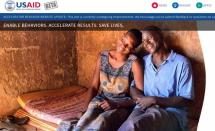Accelerator Behaviors
This is USAID’s website about the topic of Accelerator Behaviors. These 10 Accelerator Behaviors are identified in the USAID Behavior Change Framework as priority behaviors because they currently have low global uptake and they have the potential to directly impact the leading causes of maternal and child mortality.
The 10 behaviors are:
- MALARIA: Caregivers recognize symptoms of malaria and seek prompt diagnosis and appropriate care
- DIARRHEA: Caregivers provide appropriate treatment for children at onset of symptoms
- PNEUMONIA: Caregivers seek prompt and appropriate care for signs and symptoms of acute respiratory infection (ARI)
- IMMUNIZATIONS: caregivers seek full course of timely vaccinations for infants
- WATER SANITATION AND HYGIENE (WASH): Handwashing with soap at critical times (after defecation, after changing diapers and before food preparation and eating
- HEALTHY TIMING AND SPACING OF PREGNANCIES (HTSP): After a live birth, women use a modern contraceptive method to avoid pregnancy for at least 24 months (resulting in approximately three years between births)
- NUTRITION: Early initiation (within one hour) and exclusive breastfeeding for six months after delivery
- MATERNAL: Pregnant women attend antenatal care and attend facilities for delivery to reduce preventable maternal deaths
- NEWBORN: Seek prompt and appropriate care for signs and symptoms of newborn illness to reduce preventable newborn deaths
- PREVENTION OF MOTHER TO CHILD TRANSMISSION (PMTCT): Active demand at household level for identification and treatment of all HIV-infected pregnant women
The site explains each accelerator behavior, discusses how they can be integrated into existing programs, and estimates how many lives can be saved if programs addressing these behaviors are implemented.
Last modified: March 25, 2019
Language: English

